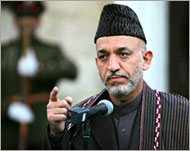Pakistan blamed for Afghan attacks
An Afghan provincial governor has accused Pakistan of training and equipping Taliban suicide bombers who have killed at least 33 people in southern Kandahar province since Sunday.

Assadullah Khalid, Kandahar’s governor, said: “The suicide bombers are trained and equipped by Pakistan and then sent to Afghanistan for sabotage activities,”
“Pakistan is sheltering and allowing senior Taliban officials on its soil, and in some cases the suicide bombers are even Pakistani nationals,” said Khalid.
“The government of Pakistan is not a new one; it has army and intelligence. Since all the senior Taliban have got their houses there and use some of them as training camps then the government should know what is going on.”
Afghan officials and US military commanders in Afghanistan often criticise Pakistan for not doing more to stop the insurgents, although Pakistan rejects the criticism and has deployed close to 80,000 troops on its long and porous border.
 |
|
Karzai said attackers were |
Many Taliban, driven out of Afghanistan by US-backed forces in late 2001, are believed to have regrouped across the border in Pakistan’s tribal areas and its western province of Baluchistan, a region that since the early 1980s has been a
refuge for Afghan families escaping conflict in their homeland.
The Kandahar governor’s comments come on the heels of similar remarks by President Hamid Karzai.
Karzai said on Sunday he had intelligence reports months ago that suicide attackers were being trained in frontier areas and most attacks were carried out by “foreigners”.
A 15-year-old suicide bomber killed five people in Kandahar city on Monday, hours before another bomber killed 23 in Spin Boldak, a town in the same province bordering Pakistan.
On Sunday, a Canadian diplomat and two civilians were killed and three Canadian soldiers and nine locals were wounded in a suicide attack on a military convoy in Kandahar city.
Agonising NATO
Escalating violence is causing some Nato members to agonise over plans to send more peacekeeping troops to the south to allow US-led forces to trim their presence there.
|
“Pakistan is sheltering and allowing senior Taliban officials on its soil, and in some cases the suicide bombers are even Pakistani nationals” |
Rangeen Dadfar Spanta, an adviser to Karzai, said the suicide attacks were intended to frighten Nato and cast a blight over an international donor conference in London later this month.
The Dutch parliament is due to debate on 25 January whether to commit 1400 more troops to a Nato force to be deployed in the volatile south, a highly contentious issue in the Netherlands.
The Nato-led peacekeeping force in Afghanistan is about 9000- strong and there are plans to increase it to 15,000, while the US-led force is about 18,000.
Al-Qaida threat
Meanwhile, the United Nations has closed its offices in southwestern Pakistan for 48 hours after receiving a telephone threat mentioning the al-Qaida terror network.
Officials said on Tuesday an unidentified person issued the “credible” threat on Monday to the UN High Commissioner for Refugees office in Quetta, the capital of restive Baluchistan province, said Jan Vandemoortele, the UN Humanitarian Coordinator .
Vandemoortele said the UN had reported the threat to the local authorities and the police and they were expecting the results of an investigation on Wednesday.